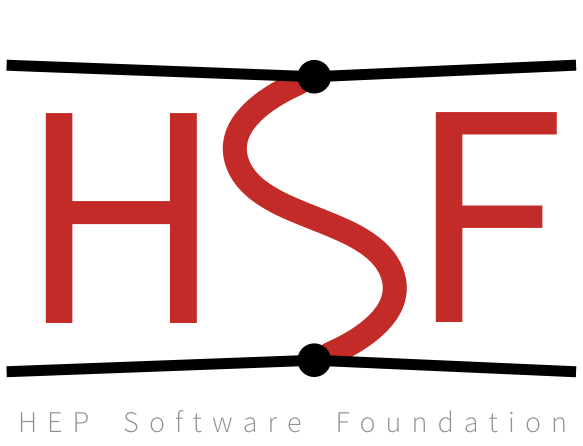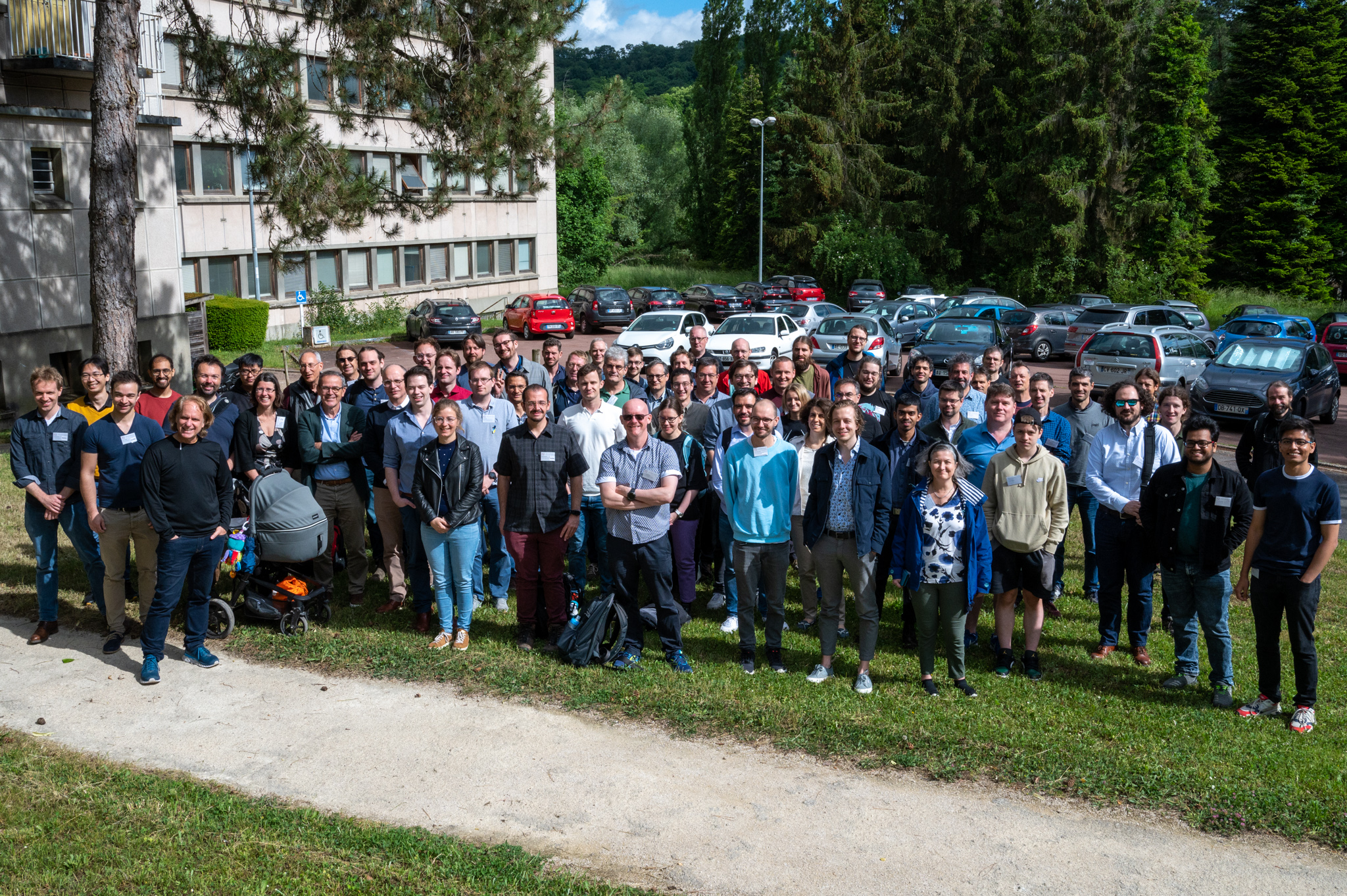Analysis Ecosystem Workshop II
Auditorium Joliot Curie
IJCLab




As part of the search for Beyond the Standard Model physics, an array of next generation particle, nuclear and astroparticle experiments are under construction by global collaborations worldwide. These include the High-Luminosity Large Hadron Collider (HL-LHC) at CERN, the Deep Underground Neutrino Experiment (DUNE) at Fermilab, the Electron Ion Collider (EIC) at Brookhaven National Laboratory, the Facility for Antiproton and Ion Research at GSI, and many others.
These experiments are massive data generators and the cutting edge data science challenges are significant. For example, the HL-LHC experiments are expected to produce exabytes of science data each year. Discoveries require analyzing these huge data volumes and understanding extremely complex instruments, with ever more sophisticated algorithms. The development of highly performant data analysis systems that reduce "time-to-insight" and maximize physics potential is crucial. This involves the continued innovation by existing community tools like ROOT, new cutting-edge data science tools, the development of dedicated analysis facilities, advanced machine learning and entirely new routes to explore, such as differentiable programming.
It has been five years since the first Analysis Ecosystems Workshop organised by the HSF in 2017. Since that time many changes have happened, with the advent of new projects, tools, and data formats, intense activity and progress in established projects. Still, the challenge of efficient analysis for the HL-LHC era is not yet solved and so the HSF and IRIS-HEP, together with IJCLab, are organising the Second Analysis Ecosystems Workshop.
Topics for the workshop will include, amongst others:
- Analysis Facilities
- ML tools and differentiable computing workflows
- “Real-time” trigger-level analysis
- Analysis User Experience and Declarative Languages
- Analysis on reduced formats or specialist inputs
- Bookkeeping and systematics handling
As a workshop, there will be limited presentations, lots of time for discussion and a written outcome that summarises the workshop’s conclusions and points the way forward.
Organisers:
- Alexander Held
- Allison Reinsvold Hall
- Eduardo Rodrigues
- Elizabeth Sexton-Kennedy
- Giulio Eulisse
- Gordon Watts
- Graeme A Stewart
- Jana Schaarschmidt
- Jim Pivarski
- Jonas Rembser
- Loukas Gouskos
- Lukas Heinrich
- Michel Jouvin
- Mike Sokoloff
- Nathan Simpson
- Nicole Skidmore
- Oksana Shadura
- Paul Laycock
- Pere Mato Vila
- Peter Elmer
- Stephan Hageboeck
- Teng Jian Koo

-
-
1
Pickup badges and lunch tickets Auditorium Joliot Curie
Auditorium Joliot Curie
IJCLab
Laboratoire de Physique des 2 infinis Irène Joliot-Curie – IJCLab Building 100A 15 rue Georges Clémenceau, 91405 Orsay France (access to the auditorium is from the parking area) -
Plenary Auditorium Joliot Curie
Auditorium Joliot Curie
IJCLab
Laboratoire de Physique des 2 infinis Irène Joliot-Curie – IJCLab Building 100A 15 rue Georges Clémenceau, 91405 Orsay France (access to the auditorium is from the parking area)-
2
WelcomeSpeakers: Michel Jouvin (Université Paris-Saclay (FR)), Valerie Chambert (Universite de Paris-Sud 11 (FR)), Valérie Chambert (IPN Orsay/IN2P3/CNRS)
- 3
-
4
New Advances in Analysis FacilitiesSpeaker: Robert Gardner (University of Chicago)
-
5
Analysis frameworks and Analysis Facilities: user experienceSpeaker: Nick Smith (Fermi National Accelerator Lab. (US))
-
6
Impact on Analysis Facilities in the context of DOMA evolutionSpeaker: Alessandra Forti (University of Manchester (GB))
-
2
-
10:30
Coffee Break Espace Joliot Curie
Espace Joliot Curie
IJCLab
-
Plenary Auditorium Joliot Curie
Auditorium Joliot Curie
IJCLab
Laboratoire de Physique des 2 infinis Irène Joliot-Curie – IJCLab Building 100A 15 rue Georges Clémenceau, 91405 Orsay France (access to the auditorium is from the parking area)-
7
Data Analysis Metadata ReviewSpeaker: Thomas Kuhr (Ludwig Maximilians Universitat (DE))
-
8
Big Questions in Systematics ProcessingSpeaker: Stephan Hageboeck (CERN)
-
9
ML Tooling and Use Landscape in HEPSpeaker: Sean Joseph Gasiorowski (SLAC National Accelerator Laboratory (US))
-
10
Differentiable Programming in HEPSpeaker: Lukas Alexander Heinrich (CERN)
-
11
Extra Discussion
-
7
-
12:30
Lunch Cantine
Cantine
IJCLab
Building 230 -
Analysis Facilities Auditorium Joliot Curie
Auditorium Joliot Curie
IJCLab
Laboratoire de Physique des 2 infinis Irène Joliot-Curie – IJCLab Building 100A 15 rue Georges Clémenceau, 91405 Orsay France (access to the auditorium is from the parking area)- 12
-
13
AFs in CMSSpeaker: Lindsey Gray (Fermi National Accelerator Lab. (US))
-
14
AFs in ATLASSpeakers: Alessandra Forti (University of Manchester (GB)), Lukas Alexander Heinrich (CERN)
-
15
AFs in LHCbSpeaker: Dr Nicole Skidmore (University of Manchester)
-
16
Discussion "Bridging analysis frameworks stakeholders and resource providers for future analysis HL-LHC facilities"
- Integrating different types of resources/”aaS” available on demand: public and private clouds, and Kubernetes (k8s): what is the best “recipe” for AF?
- "How to marry interactivity with distributed computation?" aspects related to e.g. UI design, resource management policies and debugging tools.
- Analysis containerization, feedback from point of view of users, AF architects, resource providers
- Idea of “dream” Analysis Facility, metrics and evaluation of successful AF characteristics
Speakers: Nicole Skidmore (University of Manchester), Oksana Shadura (University of Nebraska Lincoln (US))
-
ML and Autodiff Workflows 200-1-101
200-1-101
IJCLab
-
17
IntroSpeakers: Lukas Alexander Heinrich (CERN), Nathan Daniel Simpson (Lund University (SE))
- 18
-
19
Differentiable Design OptimizationSpeaker: Giles Chatham Strong (Universita e INFN, Padova (IT))
-
20
DiscussionSpeakers: Lukas Alexander Heinrich (CERN), Nathan Daniel Simpson (Lund University (SE))
-
21
AD beyond Python and MLSpeaker: Vassil Vasilev (Princeton University (US))
-
17
-
Metadata and Systematics 100-0-A018
100-0-A018
IJCLab
-
22
Metadata paper: Discussion of next stepsSpeaker: Paul James Laycock (Brookhaven National Laboratory (US))
-
23
What analysers want: Infrastructure for systematic variationsSpeaker: Enrico Guiraud (EP-SFT, CERN)
-
24
Systematics discussion
-
22
-
16:30
Coffee Auditorium Joliot Curie
Auditorium Joliot Curie
IJCLab
Laboratoire de Physique des 2 infinis Irène Joliot-Curie – IJCLab Building 100A 15 rue Georges Clémenceau, 91405 Orsay France (access to the auditorium is from the parking area) -
Plenary Auditorium Joliot Curie
Auditorium Joliot Curie
IJCLab
Laboratoire de Physique des 2 infinis Irène Joliot-Curie – IJCLab Building 100A 15 rue Georges Clémenceau, 91405 Orsay France (access to the auditorium is from the parking area)-
25
ROOT User Workshop SummarySpeaker: Axel Naumann (CERN)
-
26
Analysis user experience with the Python HEP ecosystemSpeakers: Jim Pivarski (Princeton University), Matthew Feickert (Univ. Illinois at Urbana Champaign (US))
-
27
Declarative Languages OverviewSpeaker: Sezen Sekmen (Kyungpook National University (KR))
-
25
-
1
-
-
28
News of the Day Auditorium Joliot Curie
Auditorium Joliot Curie
IJCLab
Laboratoire de Physique des 2 infinis Irène Joliot-Curie – IJCLab Building 100A 15 rue Georges Clémenceau, 91405 Orsay France (access to the auditorium is from the parking area) -
Plenary Auditorium Joliot Curie
Auditorium Joliot Curie
IJCLab
Laboratoire de Physique des 2 infinis Irène Joliot-Curie – IJCLab Building 100A 15 rue Georges Clémenceau, 91405 Orsay France (access to the auditorium is from the parking area)-
29
Reduced Formats in ATLASSpeaker: James Catmore (University of Oslo (NO))
- 30
-
31
Reduced Formats in Belle IISpeaker: Michel Hernandez Villanueva (DESY)
-
32
Real-Time and Trigger Analysis OverviewSpeakers: Caterina Doglioni (University of Manchester (GB)), Michael David Sokoloff (University of Cincinnati (US))
-
29
-
33
Group Photo Auditorium Joliot Curie
Auditorium Joliot Curie
IJCLab
Laboratoire de Physique des 2 infinis Irène Joliot-Curie – IJCLab Building 100A 15 rue Georges Clémenceau, 91405 Orsay France (access to the auditorium is from the parking area) -
10:25
Coffee Espace Joliot Curie
Espace Joliot Curie
IJCLab
-
Analysis User Experience and Declarative Languages Auditorium Joliot Curie
Auditorium Joliot Curie
IJCLab
Laboratoire de Physique des 2 infinis Irène Joliot-Curie – IJCLab Building 100A 15 rue Georges Clémenceau, 91405 Orsay France (access to the auditorium is from the parking area)-
34
Documentation, examples, benchmarking, interoperability
4 aspects of documentation: https://documentation.divio.com/
interoperability examples:
- histograms: Josh's ROOT workshop talk https://indico.fnal.gov/event/23628/contributions/237985/
- RDataFrame / awkward: Ianna's ROOT workshop talk https://indico.fnal.gov/event/23628/contributions/240305/
- statistical models: RooFit, zfit, pyhf, ... -
35
Additional topics & follow-up from previous day
lessons to be learned from Julia,
future of ADL,
...
-
34
-
Reduced Formats 100-0-Salle des Conseils
100-0-Salle des Conseils
IJCLab
-
36
Reduced formats for long lived particles in ATLASSpeaker: Jackson Carl Burzynski (Simon Fraser University (CA))
-
37
Limitations of NanoAOD and possible solutionsSpeaker: Bryan Cardwell (University of Virginia (US))
-
38
Augmenting PHYSLITE content for sub set of events in ATLASSpeaker: Lukas Alexander Heinrich (CERN)
-
39
Object Store R&DSpeaker: Nick Smith (Fermi National Accelerator Lab. (US))
-
36
-
12:40
Lunch Cantine
Cantine
IJCLab
Building 230 -
Crossover Sessions: Analysis Facilities & AI and Autodiff & UX and Declarative Languages Auditorium Joliot Curie
Auditorium Joliot Curie
IJCLab
Laboratoire de Physique des 2 infinis Irène Joliot-Curie – IJCLab Building 100A 15 rue Georges Clémenceau, 91405 Orsay France (access to the auditorium is from the parking area) -
16:00
Coffee Espace Joliot Curie
Espace Joliot Curie
IJCLab
-
BoFs and Breakouts: Let’s Define the Steps of an Analysis Workflow 100-0-A018
100-0-A018
IJCLab
Convener: Benjamin Galewsky (Univ. Illinois at Urbana Champaign (US))-
40
Discussion: Let’s Define the Steps of an Analysis WorkflowSpeaker: Benjamin Galewsky (Univ. Illinois at Urbana Champaign (US))
-
40
-
Crossover Sessions: Reduced Formats & Bookkeeping and Systematics 100-0-Salle des Conseils
100-0-Salle des Conseils
IJCLab
-
Real-Time and Trigger Analysis Auditorium Joliot Curie
Auditorium Joliot Curie
IJCLab
Laboratoire de Physique des 2 infinis Irène Joliot-Curie – IJCLab Building 100A 15 rue Georges Clémenceau, 91405 Orsay France (access to the auditorium is from the parking area)-
41
LHCb HLT1 MonitoringSpeaker: Daniel Charles Craik (Massachusetts Inst. of Technology (US))
-
42
Discussion
-
41
-
19:30
Workshop Dinner
https://bouillonracine.fr/en/home/
-
28
-
-
Continuing Discussions Auditorium Joliot Curie
Auditorium Joliot Curie
IJCLab
Laboratoire de Physique des 2 infinis Irène Joliot-Curie – IJCLab Building 100A 15 rue Georges Clémenceau, 91405 Orsay France (access to the auditorium is from the parking area)To help the workshop converge on conclusions and next steps for the HEP analysis ecosystem, we have continuing discussions on Wednesday morning
-
43
News of the Day and DIscussion Planning Auditorium Joliot Curie
Auditorium Joliot Curie
IJCLab
Laboratoire de Physique des 2 infinis Irène Joliot-Curie – IJCLab Building 100A 15 rue Georges Clémenceau, 91405 Orsay France (access to the auditorium is from the parking area)Speaker: Dr Graeme A Stewart (CERN) -
44
Further Topic Discussion Time Various Rooms in B100
Various Rooms in B100
IJCLab
-
43
-
10:30
Coffee Espace Joliot Curie
Espace Joliot Curie
IJCLab
-
Plenary: Summaries Auditorium Joliot Curie
Auditorium Joliot Curie
IJCLab
Laboratoire de Physique des 2 infinis Irène Joliot-Curie – IJCLab Building 100A 15 rue Georges Clémenceau, 91405 Orsay France (access to the auditorium is from the parking area)-
45
Analysis FacilitiesSpeakers: Nicole Skidmore (University of Manchester), Oksana Shadura (University of Nebraska Lincoln (US))
-
46
ML tools and differentiable computing workflowsSpeakers: Lukas Alexander Heinrich (CERN), Nathan Daniel Simpson (Lund University (SE))
-
47
“Real-time” online/trigger-level analysisSpeakers: Giulio Eulisse (CERN), Michael David Sokoloff (University of Cincinnati (US))
-
48
Analysis User Experience and Declarative LanguagesSpeakers: Alexander Held (New York University (US)), Jonas Rembser (CERN)
-
49
Analysis on reduced formats or specialist inputsSpeakers: Allison Reinsvold Hall (Fermilab), Jana Schaarschmidt (University of Washington (US)), Loukas Gouskos (CERN)
-
50
Bookkeeping and systematics handlingSpeakers: Paul James Laycock (Brookhaven National Laboratory (US)), Teng Jian Khoo (Humboldt University of Berlin (DE))
-
51
Let's Define an Analysis WorkflowSpeaker: Benjamin Galewsky (Univ. Illinois at Urbana Champaign (US))
-
52
Discussion
-
53
Closing WordsSpeaker: Gordon Watts (University of Washington (US))
-
45
-
12:30
Lunch Cantine
Cantine
IJCLab
Building 230 -
Report Writing
-
15:30
Coffee Espace Joliot Curie (CERN)
Espace Joliot Curie
CERN
-
Report Writing
-